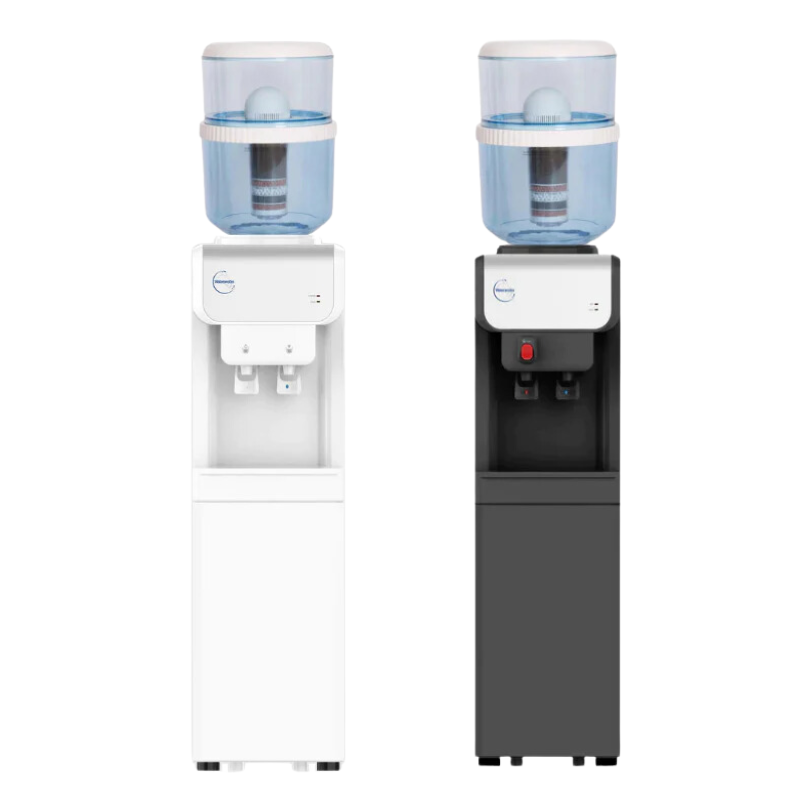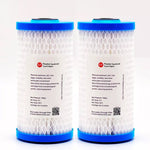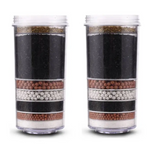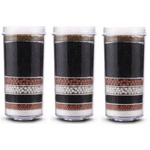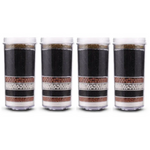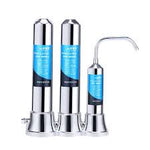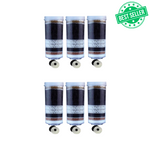You have no items in your shopping cart.
Best Fluoride Water Filter Buying Guide
Fluoride is a mineral formed from fluorine, a principal element in the Earth's crust, that exists naturally in water, many foods, soil, and rocks. Fluoride is well-known in dentistry for its ability to strengthen enamel and avoid or reverse early symptoms of tooth decay. In Australia and other nations, it's also added to the public water supply. So, if you brush your teeth twice a day with fluoride toothpaste and then drink water with safe fluoride levels, you're giving yourself the best chance of having healthy and strong teeth.
FLUORIDE IN OUR DRINKING WATER
Fluoride is added to water in some jurisdictions to reduce the risk of tooth decay. It can also get into water sources naturally. It's never completely removed throughout the treatment procedure.
If you're unsure whether your community's water contains fluoride, look up a water quality report online. You'll be able to check how much fluoride is in your drinking water and how it compares to the national average.
Fluoride is primarily found in drinking water, although you can also find it in some dental products.

WATER FLUORIDATION
The process of purposely adding fluoride to the tap water system for consumption by the wider population is known as water fluoridation. True, fluoride does occur naturally in some places, but these instances are extremely rare and irrelevant to this subject. We're talking about situations where fluoride purposely supplements or "spikes" into the water system.
RISKS OF FLUORIDE IN YOUR WATER
When you examine the potential health concerns of fluoride, there's a lot of disagreement regarding whether the benefits of fluoride for oral hygiene are worth it. The following are some of the health risks:
Dental Fluorosis
White patches or yellowing on the teeth are signs of dental fluorosis. Fluoride poisoning is caused by swallowing significant fluoride levels, particularly as a youngster, when teeth are still developing and growing behind the gums.
Fluorosis has little effect on tooth function, but it can cause aesthetic harm and dramatically improve the teeth' appearance. Dental fluorosis that is severe enough can cause pits to grow in the teeth.
Fluorosis does not affect adults. Only youngsters under the age of eight, whose teeth still are forming, are at risk. The more exposure a child is to fluoride, the higher their risk of acquiring fluorosis. Despite its ability to prevent tooth decay, fluoride can cause discoloration that looks nearly as terrible as mild decay.
Thyroid Issues
The thyroid is among the organs in the body which is most affected by excessive fluoride. Fluoride is particularly harmful to the thyroid gland because it mimics TSH or thyroid-stimulating hormone, unnecessarily increasing the hormone's effects. Fluoride may also cause iodine to exit the thyroid gland, requiring thyroid hormone production.
The thyroid gland is responsible for different functions, including the regulation of the body's metabolic rate. When minerals such as fluoride interfere with its function, it can cause a slew of health problems. It's also associated with an increased rate of an underactive thyroid, characterized by fatigue, weight gain, and depression.
Skeletal Fluorosis
Too much fluoride in the bones causes skeletal fluorosis. This disease can result in irreversible harm to the skeletal system and discomfort, and decreased joint motion.
A high fluoride level in a person's body might lead their bones to stiffen, limiting their flexibility. Individuals with skeletal fluorosis are more likely to break bones and have hardened cartilage and ligaments as a result.
Drinking water with a high fluoride level is among the most likely reasons for skeletal fluorosis. Inhaling fluoride gases in a production setting and drinking fluoride tea, particularly tea bricks, are two more causes.
Fluoride Poisoning
Fluoride poisoning, also known as fluoride toxicity, occurs when the body's fluoride levels are too high. Although fluoride is considered harmless in modest doses, it has the possibility of causing health problems if eaten in big amounts.
Fluoride poisoning via drinking water is extremely improbable in Australia since it's strictly regulated. However, if you consume from a well and don't test the fluoride level in your water, you could be in greater danger.
Neurological Problems
Scientists are only now starting to comprehend the brain consequences of too much fluoride. According to one study, fairly high fluoride exposure can result in decreased IQ. There's also a discovery that it can be neurotoxic, which implies that it can harm the brain.
Fluoride is linked to memory and learning problems and potential impairment to unborn babies' brain development. It can also cause neurobehavioral difficulties and impairments. More research into why fluoride can have such negative effects on the brain is needed, but several research studies have shed light on what we know so far about the issue.
HOW DOES A FLUORIDE WATER FILTER WORK?
For effective fluoride removal, fluoride water filters use reverse osmosis, activated alumina adsorption, strong base anion exchange, or distillation.
A reverse osmosis system, a whole home water filter, a water filter pitcher, an under-sink or countertop filtration system, a shower filter, a water filter bottle, an inline water filter, or a water distiller are all examples of filters.
The most significant benefit of employing a fluoride filter is that your drinking water will be healthier and taste better.
WATER FILTERS THAT REMOVE FLUORIDE
Reverse Osmosis

Most reverse osmosis filter units are installed under a kitchen sink and have the same outward configuration as an under-sink filter. They connect to the cold water line and filter the water before returning it to the pipe and the faucet. Other newer types rest on your counter and don't require a direct water supply.
A reverse osmosis membrane is used in these filters to prevent up to 99.9% of total dissolved solids (TDS) from going through with the water. As a result, it's is among the most efficient fluoride-removal procedures.
Water Distiller
A water distiller works by boiling water, evaporating steam, and condensing the steam into liquid form. There is no fluoride removal filter in distillers. Instead, many pollutants are kept in the boiling chamber during the evaporation phase because they cannot change shape when heated. One of these pollutants is fluoride.
In a countertop water distiller, distillation for 1 gallon of water takes around 4 and 6 hours. On the other hand, distillation is one of the most complete and successful ways to remove fluoride.
Undersink Fluoride Filter
The cold water pipe beneath the kitchen sink connects to the under sink water filters. When you turn on your kitchen sink faucet, water runs out of the tube through the filter. Then, it backs into the pipe, where it flows through the kitchen sink faucet.
Water filters that filter fluoride from under the sink normally include many filters to reduce different sizes of sediment and pollutants. A fluoride-removal under-sink filter will contain a filter stage that catches fluoride particles, keeping them from mixing with smaller water particles.
Water Pitcher Filter
The cheapest way to remove fluoride from your water is to use a pitcher filter. To use, fill the pitcher halfway with water and allow it to travel through the filter that captures pollutants. Water can take up to 15 minutes to fully filter, while specific timings vary depending on the kind and age of the filter.
Again, there aren't many water filter pitchers that can properly filter fluoride, so do your homework. Filters that can reduce fluoride will have a unique sort of activated carbon in them to do so.
Gravity Water Filters
Gravity water filters are straightforward systems consisting of two containers piled on top of one another. The filtration procedure starts by using at least two or more filter media housed in these containers.
Depending on the brand, you can then access your water through a tap. Pour water into the topmost container, and gravity will pull the water down into the bottom container. The water will pass through the filter media along the way. It removes all pollutants, silt, and contaminants as a result.
The gravity filter is popular among users because it is simple to use and install. It's also lightweight and inexpensive. Gravity filters, on the other hand, must be refilled regularly. The sluggish filtration procedure may potentially be a bother for certain people.
Faucet Water Filters
Filters that attach to the end of a kitchen tap are known as faucet water filters. When you switch on a faucet, water goes through it, then through the filter, and finally out of the filter's spout. The filter medium traps the bigger particles in the water, resulting in cleaner, purer drinking water.
Most faucet water filters do not reduce fluoride, so carefully study the product description and reviews before deciding.
BENEFITS OF USING A WATER FILTER TO REMOVE FLUORIDE

Better Water Quality
Fluorides are one of the many toxins, chemicals, and toxins present in our water supply. Aluminum, fertilizer, steel, and other nuclear wastes are all sources of fluoride. As a result, when they're exposed to or swallowed by humans, they are extremely poisonous.
Fluoride has been linked to cancer in several studies. Also, it has a connection to neurological issues. It can be fatal when consumed by pregnant ladies, children, the aged, and people with weakened immune systems.
You'll require your water fluoride filter to prevent this. You'll be able to drink safe and clean water after installation.
Flexible
Water fluoridation systems are also adaptable, as they come in various types, styles, and styles to meet different needs.
For those who have large households and want convenience, you have reverse osmosis and distillation systems. On the other hand, small and portable types such as the water filter pitcher and gravity filter systems are available.
Cost-Efficient
You wouldn't have to go through the hassle of buying water bottles or gallons if you had a water fluoride filter. As a result, you'll be able to deduct some of your household expenses effectively.
BEST FLUORIDE WATER FILTER BUYING GUIDE
Water Filter Type
The type of fluoride water filter you choose determines your needs and the size of your family.
It allows you to filter big amounts of water quickly. If you have a large home, more sophisticated systems such as reverse osmosis and distillation are appropriate. In addition, they can filter a wide range of chemicals, toxins, and pollutants.
They may, however, be rather costly to use and maintain. It's also very bulky, so make sure it's in a location where it won't disturb you.
Smaller filters, such as gravity-fed filters and water pitcher filters, are an excellent choice for those who live alone or rent. These are not only inexpensive, but they are also simple to install and run.
Lifespan
The lifespans of all fluoride removal filters are not the same. Some filters are good for three months, while others are good for a year. If you select a device with a cheaper initial cost, evaluate whether replacing twice as many filters per year will increase prices in the long term. When a filter needs replacement, it will become significantly slower at filtering water or stop working altogether, so it is not one that you can put off or avoid.
Maintenance and Installation
It's critical to comprehend the installation process as well as the long-term maintenance costs. Whole-house or reverse-osmosis water filters require installation, which you can do yourself or hire a professional to accomplish.
In terms of maintenance, replacing cartridges should be straightforward because most replacement filters are readily available. Examine the expected annual cartridge replacement costs to see if they're within your budget in the long run.
FINAL THOUGHTS
This Best Fluoride Water Filter Buying Guide from Ace Water Coolers aims to guide you in finding the right water filter to remove fluoride.
You and your household's requirements mostly determine the right fluoride water filter. Water distillers, under sink water filters, and pitch water filters are excellent solutions if you only need filtering for drinking or cooking. On the other hand, a shower filter can be a smart alternative if water irritates your skin or hair.
However, if you require filtered water throughout your home, a whole house water filter is the best option. Although most whole-house water filters are costly, they are well worth the investment in the long term.

